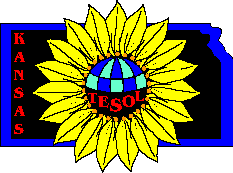Memorandum to Kansas State Board of Education
KATESOL/BE Alerts Board to Vital Concerns!
Also, read the reply from KSDE!
To: Kansas State Board of Education
From: Executive Board, Kansas Teachers of English to Speakers of Other Languages/Bilingual Educators (KATESOL/BE)
Re: Best Educational Practices in the Instruction of English Language Learners (ELLs)
Dated: July 7 2003
Enclosed you will find a copy of a recent research report
conducted by Wayne Thomas and Virginia Collier and funded
by the U.S. Department of Education, on "School Effectiveness
for Language Minority Students' Long-Term Academic Achievement."
This report shows that students who received several years of
bilingual education early on did better and out-performed those
who received pull-out English to Speakers of Other Languages
(ESOL) by the time both were in junior high/high school. The
report confirms the importance of providing first language support
in content subjects, e.g., mathematics and science. It also
shows that those students who were put into immersion or
"English-only" classrooms failed academically and linguistically.
We bring this report to your attention because, as the only
professional education organization in the State of Kansas
dedicated to the area of ESOL instruction, we feel it is of the
utmost importance that the Board has a working knowledge
of this information as it begins to address the mandates of
No Child Left Behind (NCLB).
Native language support has been proven, in the only scientifically
based study of long-term instructional efficacy, to be the best program
model to ensure that English language learners (ELL) succeed
academically. With the prescriptive and limited view of intelligence
put forth in NCLB, Kansas school districts will need every tool
they can use to ensure that their schools are not destroyed by
this law. We encourage the Board to take a pro-active stance
and direct KSDE to offer assistance to districts in the development
of models of instruction which incorporate native-language support
so that our districts can determine and meet the needs of their
diverse learners and provide them with greater opportunities of
academic success.
Secondly,KATESOL/BE would also like to take this opportunity
to express our grave concern over the process and procedure
KSDE is using in its attempts to develop an assessment of
English Language Development (ELD) as prescribed by NCLB.
Our membership, which has been involved in the development
of ESOL Standards over the course of the past two years and
the development of the ELD assessment since last September,
has reported to us their concerns over the role CETE (Center
for Testing and Educational Evaluation, University of Kansas) is
playing in the development of this assessment. KATESOL/BE
believes it is our obligation to inform and support KSDE in assuring
that the assessment under development is not only valid and
reliable, but also guarantees equity for our ESOL population in
the State of Kansas.
In particular:
ESOL professionals have very grave concerns about the ability
of CETE to produce the ELD assessment. They have no prior experience
in applied linguistics and it is evident from the comportment of CETE
employees that they also do not hve a thorough understanding of the
process incurred in the development of Standards for ESOL instruction.
ESOL professionals deplore the fact that items used in the field
test of the ELD assessment this spring, and which have been proposed
for consideration in the final version of the assessment, were written
using graduate students who have no experience in the instruction
of ELL nor of applied linguistics.
ESOL professionals also question why Kansas is developing
on its own an assessment whose outcome will determine future
Federal funding for our districts under Title III and will affect the academic
future of ESOL students, when the Council of Chief State School Officers
(CCSSO) is developing, with 38 other states, an assessment which will
be state of the art. KATESOL/BE urges the Board to direct the leadership
of KSDE to abandon pursuit of the development of an English Language
Acquisition assessment with CETE. We request that the Board direct
KSDE to return to the Limited English Proficient State Collaborative
on Assessment and Student Standards (LEP SCASS) of the Council
of Chief State School Officers, who have the expertise needed to develop
an assessment which is valid, reliable and equitable.
(NB: Kansas was a member of the LEP SCASS until July 02 when a decision
was made by KSDE leadership, with no input from professionals in the field,
to withdraw from the LEP SCASS.) The LEP SCASS of the Council will
provide the best model of testing language proficiency and will ensure that
Kansas school children have an assessment that is not punitive in nature,
but encourages language learning and development.
Finally, KATESOL/BE has included the following articles, which we feel
provide important background information for the Board in understanding
our decision to speak out on the above issues:
The National Association of State Boards of Education (2001). A More
Perfect Union: Building an Education System that Embraces All Children,
Washington, DC: NASBE.
Valdez Pierce, Lorriane (2003). Accountability and Equity: Compatible
Goals of High-Stakes Testing? TESOL Matters, Vol. 13, No. 2.
Singham, Mano (2003). The Achievement Gap: Myths and Reality, Phi
Delta Kappan, Vol. 84, No. 8. (In this article the discussion of African-American
students is equally applicable to our large Latino/Latina school populations throughout
Kansas.)
Note: This memorandum to the Kansas State Board of Education was
composed by Chris Renner, KATESOL/BE President (2003-2004), with input
from members of the KATESOL/BE Executive Board.
This page was last updated on 08/07/2003.
